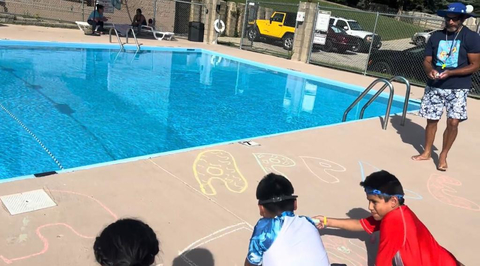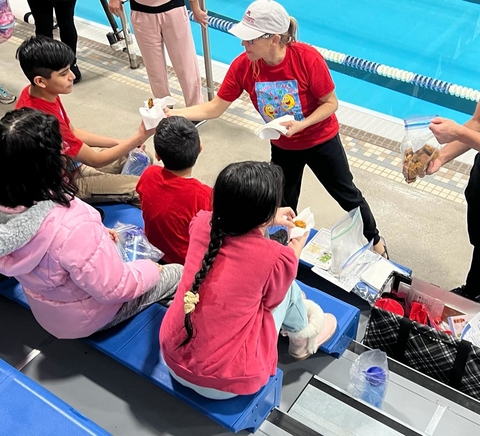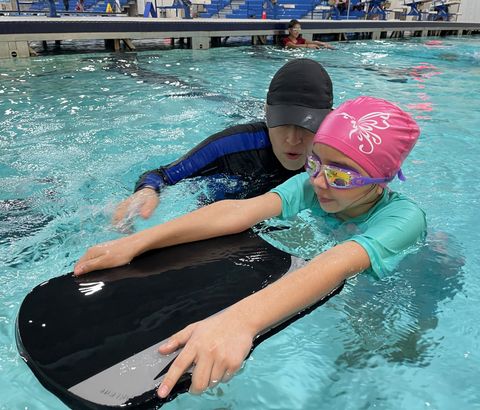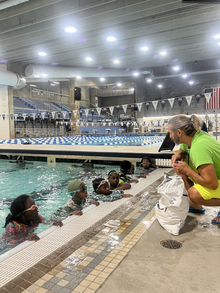"Fishes n' Apples" University of Minnesota Extension SNAP-Ed program teaches youth swimming and nutrition education in Olmsted County.
The community outdoor pool is a hub of summer fun at the Oak Terrace and Parkside mobile home neighborhoods in Rochester. However, beneath the surface is a concerning reality — many neighborhood children don't know how to swim.
Unintentional drowning is the leading cause of death for children under five and the second leading cause for children under 15 in the U.S. Although strides have been made in reducing drowning fatalities in the past few decades, disparities persist, particularly among youth from diverse racial and ethnic backgrounds.
For Reina Moreno, a mother of three, it's a pressing issue. All of her children have little to no experience with swimming, especially her 8-year-old daughter, Lizette. "She was scared to even put her foot in the water," says Moreno.
Now, thanks to a local initiative that's been making waves of change in Olmsted County, young people like Lizette are not only learning to swim but gaining valuable information to support their health and wellbeing.
Diving deeper to address community needs
Collaborating with community partners like R-Neighbors, Rochester Recreation Center, and the Intermix Project, University of Minnesota Extension's "Fishes n' Apples" program tackles two critical health concerns for children: swim safety and nutrition.
"I've seen the urgent need for diverse communities in this neighborhood to access healthy, nutritious foods and physical activity. But when I saw how children in the area lacked proper swimming skills, I knew there was another need for these families to have access to swim safety education," says Extension SNAP-Ed* health and wellness coordinator Milena Nunez Garcia.
Under the guidance of Red Cross instructors specializing in swimming, water safety and CPR, nutrition educators and community volunteers, the program combines swimming with nutrition education.
During eight classes, youth learn life-saving skills and how to cultivate healthy habits by engaging in activities like water safety lessons, recipe preparation and tasting nutritious foods.
Immersive experiences lead to lifetime lessons
But it goes beyond education. "Swimming can help children develop essential life skills they can carry into adulthood," says Nunez Garcia.
By providing a fun, social, and safe environment, the program helps youth build their confidence and form trusting relationships.
"The most impressive thing for me is to see the children stop being afraid of even putting their faces in the water and, with practice, move from one side of the pool to the other, feeling safe and confident in themselves," says Nunez Garcia.
Moreno saw the growth in her daughter's confidence too.
"The program has strengthened her self-esteem and self-motivation," says Moreno. "Watching her over the weeks, I saw how she went from being afraid to put her feet in the water to becoming more and more brave to take her first jump."
Moreno sees how her daughter's newfound confidence is extending beyond the pool.
"My daughter now likes socializing and meeting new friends," says Moreno. "When she received a neighbor's invitation to a birthday pool party, she was so happy. Even though she still needs to learn many things, she is always looking forward to jumping into the pool if there's a chance, motivated to keep learning and getting better and better."
Rippling effects across the community
Youth’s trust and growth are largely due to the collaboration, cultural responsiveness and communication between and among the instructors, volunteers and families.
"Having the opportunity to work across languages in English, Spanish and Somali has helped us form respectful and understanding relationships where parents, instructors and community volunteers work harmoniously together," says Kowsar Adan, Extension SNAP-Ed health and wellness coordinator.
One parent expresses gratitude for the opportunity to engage and support their child's progress, "I enjoyed being able to talk with the instructors and be there to help my child learn."
From families interacting with instructors and youth interacting with other neighbors, the program creates a sense of belonging and shared identity for the larger community.
Nunez Garcia credits Jose Cruz, Rochester Recreation Center pool manager and instructor, for his collaboration in bringing the community together.
"Thanks to the care he holds for the community and carries out his work in a social dimension, he adds values like respect, honesty, solidarity and love, which are undoubtedly investments in the future for our community that will create a ripple effect for years to come."
*Supplemental Nutrition Assistance Program Education





